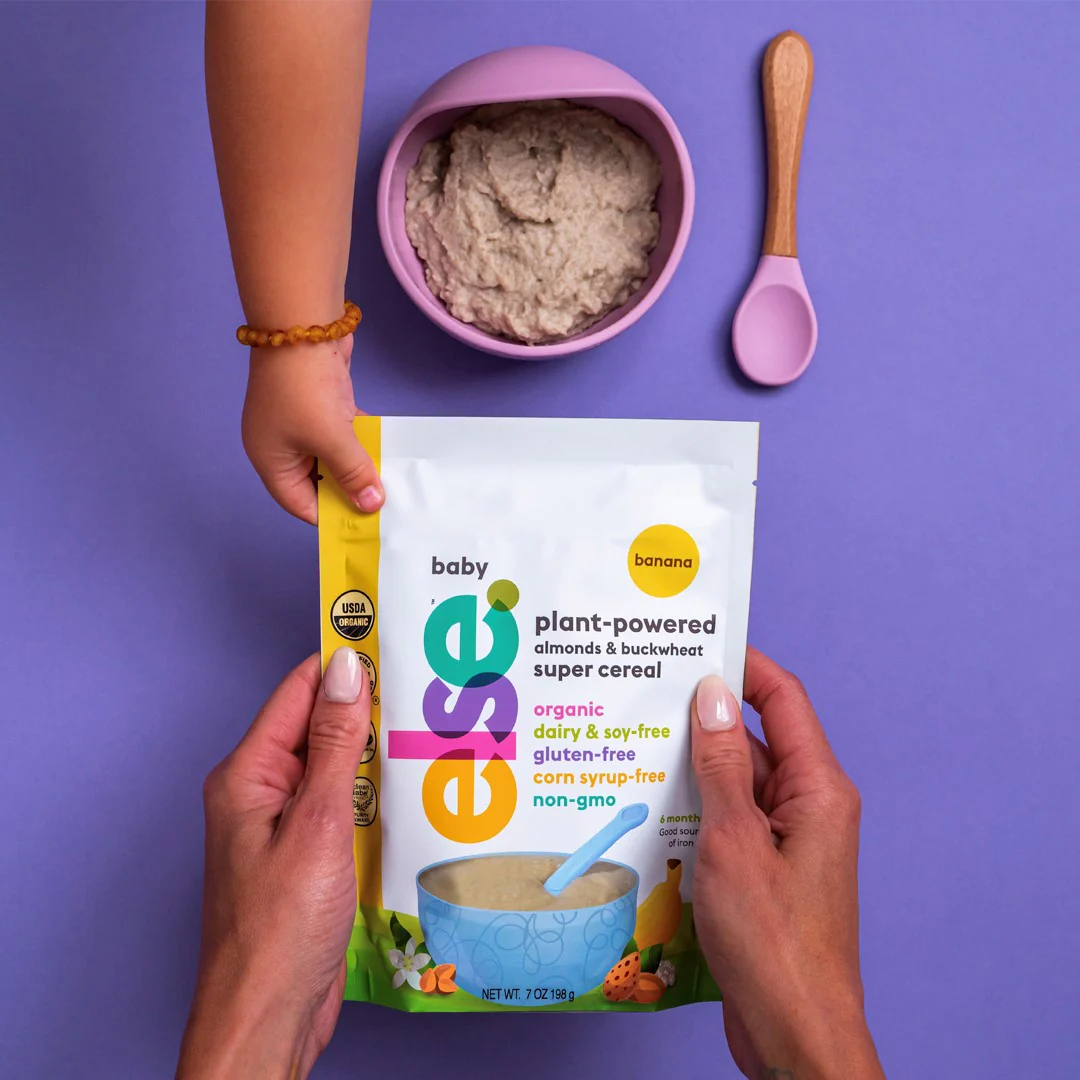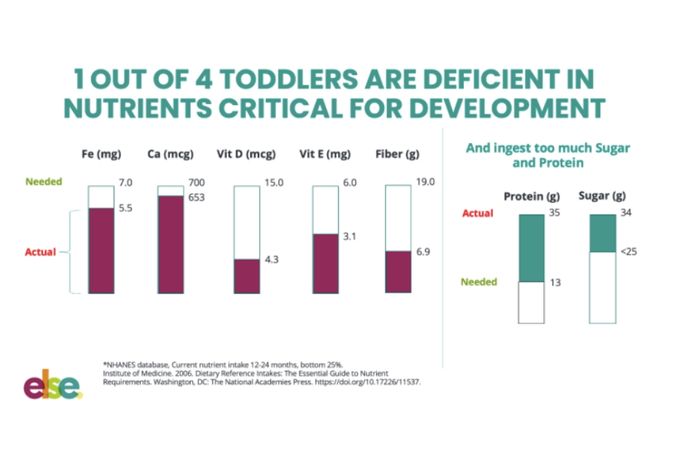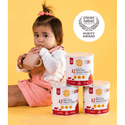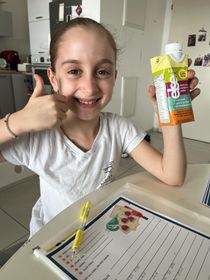Nutrition's Key Role in Toddler Growth
As your little one grows bigger and stronger, they need the right kind of food to help them grow and learn. Find out how healthy eating can make your toddler happy and healthy.
Updated September 30, 2024

Toddlerhood is a critical period for a child's growth and development. During this time, proper nutrition plays a vital role in supporting their rapidly growing bodies and laying the foundation for lifelong health.
But toddlers can be notoriously picky eaters, often limiting their diets to a narrow range of foods. As parents, we should understand the importance of toddler nutrition and learn to navigate the challenges that come with it.
» Introducing solids? Try the 1st Clean Label Certified Baby Cereal in the US
A Chart of Daily Toddler Nutritional Needs
The daily nutritional requirements for toddlers 1–2 years and upwards vary based on age, gender, and activity level. Here are the key requirements according to the 2020-2025 Dietary Guidelines for Americans [1]:
| Nutrient | 1–2 Years |
|---|---|
| Calories | 700-1000 kcal |
| Protein | 13 grams |
| Fat | 30-40% of total calories |
| Carbohydrates | 45-65% of total calories |
» Check out our essential guide to key nutrients for toddlers
Recommended Daily Servings by Food Group
The daily servings for toddlers aged 1–2 years are as follows [1]:
| Food Group | Servings (1–2 years) |
|---|---|
| Fruits | 1–1.5 servings |
| Vegetables | 1–1.5 servings |
| Cereals and grains | 4 servings |
| Meats and alternatives | 2 servings |
| Dairy | 2–2.5 servings |
Additional Recommendations
- Fruits: Aim for a variety of colors and types, including whole fruits.
- Vegetables: Include a mix of dark green, red, and orange vegetables, as well as legumes.
- Grains: Focus on whole grains, such as whole wheat bread, brown rice, and oatmeal.
- Protein: Incorporate lean meats, poultry, fish, eggs, beans, peas, and nuts.
- Dairy: Choose milk, yogurt, and cheese, preferably low-fat or fat-free options when appropriate.
» Simplify meal prep: Explore easy frozen baby food recipes
Foods and Ingredients To Avoid
1. Added Sugars
The 2020–2025 Dietary Guidelines for Americans recommend avoiding added sugars until after your little one is 2 years old. By having them, your kid gets calories without nutritional value—which can lead to type 2 diabetes.
Baby nutrition companies advertise their products as healthy, but that's often not the case. A study from the George Institute reveals that two-thirds of infant foods fail to meet nutritional guidelines. [2] You're left with a product filled with sugars, artificial ingredients, and preservatives.
So, how do you help your kid gain healthy weight?
With that one question in mind, we have created the Else NutritionBaby Super Cereal. It's free from corn syrup, meaning it doesn't spike your little one's blood sugar levels. You won't have to browse online forums for hours on end looking for the healthiest option for your child.
But sugar isn't the only culprit. Many products on the market have heavy metals and arsenic. Else Nutrition products are Clean Label Certified and pediatrician-approved. So, you don't need to wast hours in the store reading the ingredients and checking online if they are safe for your little one.
We guarantee our products are free from:
- Corn syrup
- Heavy metals
- Arsenic
- Flavorings
- Additives
- GMOs
- Dairy
- Gluten
- Soy
2. Sodium
The guidelines suggest limiting sodium intake for toddlers, as it's linked to high blood pressure and other health issues. [1] Processed foods, such as crackers, canned soups, and deli meats, are major contributors of sodium in the diets of young children.
» Find out what you don't know about store-bought baby food
3. Saturated Fats
While your kid can eat saturated fats if they are under 2 years old, the guidelines emphasize that it's important your little importance of eating healthy unsaturated fats from avocados, nuts, seeds, and fatty fish.
4. Unpasteurized Foods and Honey
Avoid unpasteurized milk, juices, and foods. [1] They might seem healthy, but bacteria and and foodborne illnesses are just waiting for your kid to eat them. Additionally, you shouldn't give your kid honey before they are 12 months old due to the risk of botulism, which causes paralysis and respiratory failure. [1,3]
» Nurture your child’s natural defenses: Learn how food fuels immunity
How to Know if Your Child Has Eaten Enough?
Toddlers quickly develop a personality, which shows its first signs during meal time. They may take a few bites, or eat a lot at breakfast but very little during the day. Sometimes, the food on their plate ends up everywhere except their in their stomach.
During such a transition, toddlers are vulnerable to nutrient inadequacy. Lack of iron, zinc, calcium, and vitamin D may result in an inadequate diet. This is where a toddler formula can make a difference.
Watch your toddler while they're eating. If they ask for food or seem interested in what you're eating, it probably means they're hungry. They might be full If they push their food away or don't want to eat more. It's okay for them to leave some food on their plates. But if they always finish everything or ask for more, they might need more.
» End mealtime battles: Try strategies for stress-free eating
What to Do if Your Child Is a Picky Eater
Create a Positive Mealtime Environment
Be relaxed and avoid pressuring your kid to eat certain foods. You'll just create negative associations with them. Instead, share meals as a family. Why? Because you're modeling healthy behaviors and making mealtime a social event, you can encourage your little one to be less picky.
» Beat the picky eater phase: Get toddler meal ideas they can’t resist
Encourage Exploration of New Foods
Trying to introduce new food but your baby is shoving the spoon away? Research shows it takes more than one exposure before a child is willing to try it. Let your little one participate in meal preparation. A meal they helped make is sure to interest them more.
Use Positive Reinforcement
Kids model their behavior by looking at us. So, your little one won't eat healthy if you don't. Show them you enjoy eating various healthy foods for positive reinforcement. Praise them, even if they take the tiniest bite. Doing so reduces their anxiety about trying new foods.
Offer Choices
Provide a range of healthy options at each meal and allow your toddler to choose what they want to eat. A variety of choices can give them a sense of control and make them more likely to eat.
Pair new foods with familiar favorites to make them more appealing. For example, serve new vegetables alongside a favorite dip or sauce.
» Expand your picky eater’s plate with delicious and nutritious side dishes
Be Patient and Consistent
Remain calm and patient. Picky eating is common in toddlers, and it often improves over time. Avoid showing frustration, as this can lead to resistance. Establish regular meal and snack times. A consistent schedule can help toddlers feel more secure and open to trying new foods.
Avoid Counterproductive Strategies
Avoid using rewards or bribes, as this can create a transactional relationship with food and may lead to further picky eating behaviors. Also, minimize distractions during meals, such as screens or toys, to help your toddler focus.
Managing food allergies and intolerances.
Introduce Allergenic Foods Early
Introducing potentially allergenic foods, such as peanuts and eggs, during the first year of life can significantly reduce the risk of developing allergies. Recent studies suggest that introducing these foods between 4 to 12 months of age is beneficial, especially for children at high risk of allergies (e.g., those with a family history). [4]
» Discover safe and effective supplements for babies with food allergies
Monitor Family History
If there is a family history of allergies, consult with a pediatrician or an allergist. They may suggest specific strategies or testing to identify potential allergens early on. A visit to a doctor is especially important for families with a known history of food allergies, eczema, or asthma. [5]
Avoid Delaying Solid Foods
Delaying the introduction of solid foods beyond six months can increase the risk of allergies. It is crucial to introduce a range of foods, including fruits, vegetables, grains, and proteins, to help your toddler develop a diverse palate and reduce the risk of allergies. [6]
» Don’t miss the signs! Learn when to introduce solids
Educate and Prepare
Educate yourself and caregivers about food allergies, including how to recognize symptoms and manage potential allergic reactions. Familiarize yourself with food labels and understand cross-contamination risks. This knowledge is vital in ensuring a safe eating environment for your toddler.
Consult Healthcare Professionals
Regular check-ups with a pediatrician can help monitor your child's growth and dietary habits. If there are concerns about allergies, a referral to an allergist for specialized testing and management may be necessary. This will ensure that any allergies are identified and managed effectively.
» Join Dr. Leah Alexander in exploring healthy toddler diets
Little Eaters, Big Gains
Nutrition is undeniably a cornerstone of toddler growth. It's the essential building block for healthy bodies and minds. Ensure your little one eats a nutrient-rich and balanced for their physical and cognitive development.
Protein, healthy fats, and vitamins and minerals are all necessary for their little bodies to develop. Aim for unprocessed foods while limiting sugary drinks ti set them on a lifelong path of health and happiness.
References:
- Dietary Guidelines for Americans 2020 - 2025. Available: https://www.dietaryguidelines.gov/sites/default/files/2021-03/Dietary_Guidelines_for_Americans-2020-2025.pdf
- The George Institute for Global Health, “Two thirds of baby foods in US grocery stores are unhealthy, study shows,” The George Institute for Global Health. Available: https://www.georgeinstitute.org/media-releases/two-thirds-of-baby-foods-in-us-grocery-stores-are-unhealthy-study-shows
- D. Yetman, “What’s the connection between botulism and honey?,” Healthline, Apr. 16, 2020. Available: https://www.healthline.com/health/botulism-honey
- “Nutrition in toddlers,” PubMed, Aug. 15, 2018. Available: https://pubmed.ncbi.nlm.nih.gov/30215978/
- C. Davisse‐Paturet et al., “Use of partially hydrolysed formula in infancy and incidence of eczema, respiratory symptoms or food allergies in toddlers from the ELFE cohort,” Pediatric Allergy and Immunology, vol. 30, no. 6, pp. 614–623, Jul. 2019, doi: 10.1111/pai.13094. Available: https://pubmed.ncbi.nlm.nih.gov/31206800/
- J. Koplin, V. Soriano, M. Netting, and R. Peters, “Infant feeding patterns before and after changes to food allergy prevention guidelines in Australia,” The Medical Journal of Australia, vol. 217, no. 4, pp. 210–211, Jun. 2022, doi: 10.5694/mja2.51627. Available: https://www.ncbi.nlm.nih.gov/pmc/articles/PMC9540109/
FAQs
What is the most common nutrient efficiency in toddlers?
Iron deficiency is the most common nutrient deficiency in toddlers. This is largely due to rapid growth and development during this stage, which requires a higher intake of iron for blood production.
What is the most important macronutrient for toddlers?
Protein is considered the most important macronutrient for toddlers. It is essential for growth and development, as it helps build and repair tissues, including muscles, bones, and organs.
What are the symptoms of nutritional deficiency in toddlers?
- Slow growth: Compared to peers of the same age.
- Fatigue or low energy: May appear lethargic or easily tired.
- Pale skin, lips, and nail beds: Can indicate iron deficiency.
- Hair loss or brittle hair: Often associated with iron or protein deficiency.
- Dry skin, brittle nails, or dental problems: May be signs of vitamin or mineral deficiencies.
- Muscle weakness or poor muscle tone: Can be indicative of protein or other nutrient deficiencies.
Which food is good for my toddler's brain development?
Foods high in omega-3 fatty acids:
- Fatty fish: Salmon, mackerel, sardines, and trout
- Chia seeds
- Flaxseeds
- Walnuts
Foods high in iron:
- Lean meats: Chicken, beef, and pork
- Eggs
- Lentils
- Fortified cereals
Foods high in choline:
- Eggs
- Liver
- Salmon
- Soybeans
- Broccoli
Disclaimer: The content and advice provided in this article are for informational purposes only and are not a substitute for medical diagnosis, treatment, or advice for specific medical conditions. Always consult a pediatrician to understand your child's individual needs.













